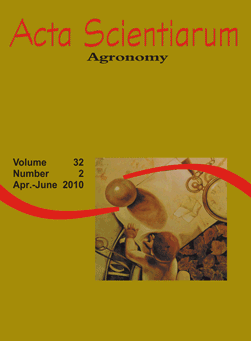<b>Thermal losses in coffee dryer</b> - DOI: 10.4025/actasciagron.v32i2.3676
Keywords:
loss of temperature, drying, coffee, fixed bed
Abstract
This study aimed to evaluate the temperature reduction in the external parts of a fixed-bed coffee dryer, by means of different combinations of revolving times, using a noncontact thermometer. The experiment was developed in the month of June 2004 at a farm located in Jesuítas, Paraná State, Brazil. Coffee (Coffea arábica L.) variety IAPAR 59 was used. The dryer used was of the fixed-bed model, with metallic drying chamber, with cylindrical format, with an adapted grain revolving system. It was observed that there was a thermal reduction of 156,7°C (79.1%) in the system going from the furnace to the drying chamber. The combination that provided smaller reduction of temperature was with continuous ventilation and 40 minutes revolving interval at every 3 hours until the end of the process. The combination that provided the greatest reduction in temperature was with continuous revolving, with a reduction of 81.09% in the surface temperature of the product.Downloads
Download data is not yet available.
Published
2010-04-27
How to Cite
Greco, M., Campos, A. T., & Klosowski, E. S. (2010). <b>Thermal losses in coffee dryer</b> - DOI: 10.4025/actasciagron.v32i2.3676. Acta Scientiarum. Agronomy, 32(2), 209-212. https://doi.org/10.4025/actasciagron.v32i2.3676
Issue
Section
Agricultural Engineering
DECLARATION OF ORIGINALITY AND COPYRIGHTS
I Declare that current article is original and has not been submitted for publication, in part or in whole, to any other national or international journal.
The copyrights belong exclusively to the authors. Published content is licensed under Creative Commons Attribution 4.0 (CC BY 4.0) guidelines, which allows sharing (copy and distribution of the material in any medium or format) and adaptation (remix, transform, and build upon the material) for any purpose, even commercially, under the terms of attribution.
2.0
2019CiteScore
60th percentile
Powered by 

2.0
2019CiteScore
60th percentile
Powered by 



















































